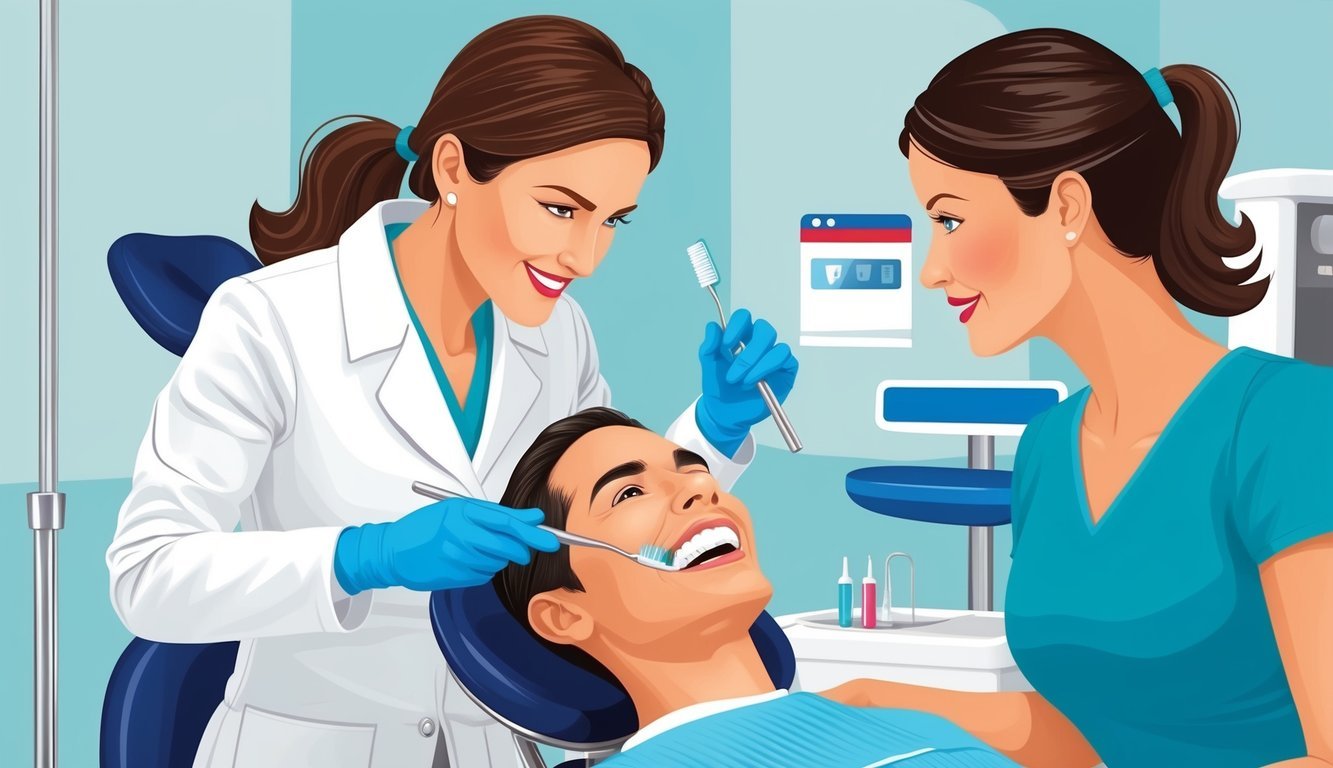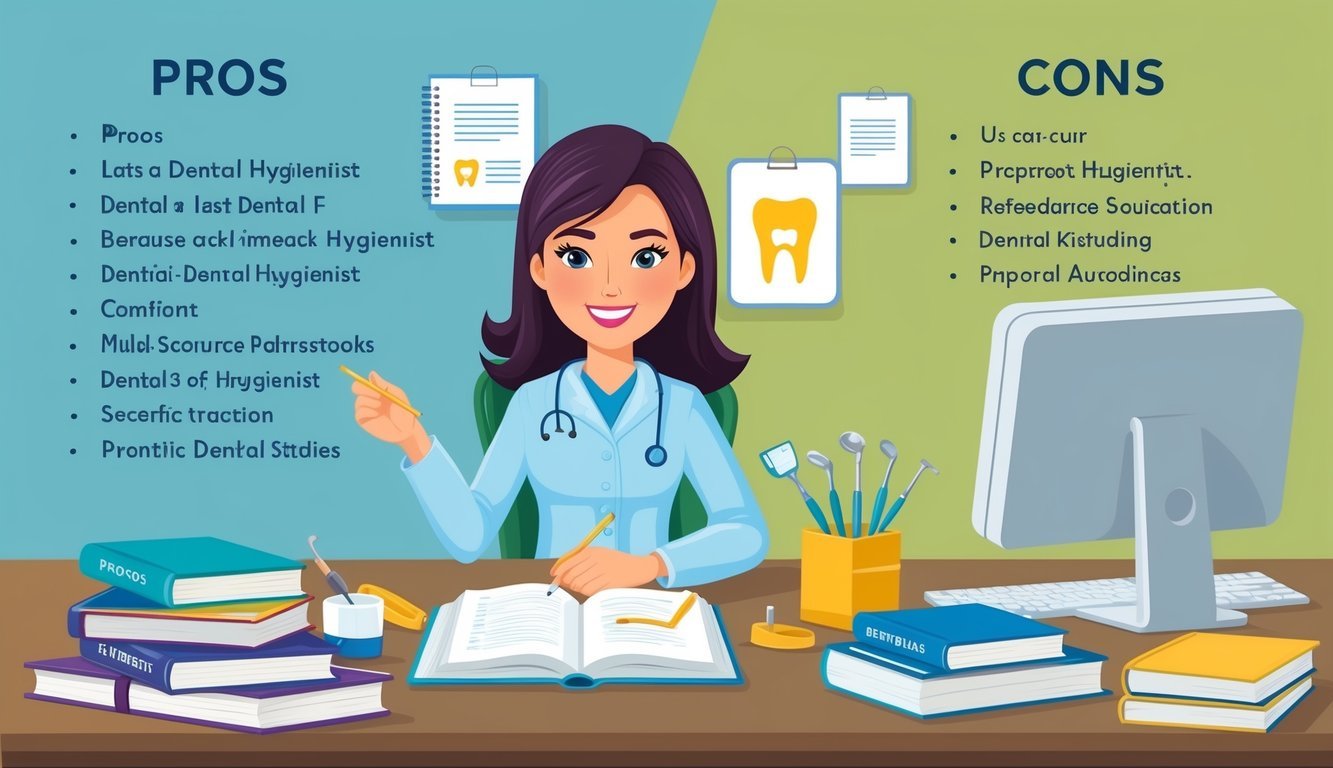Choosing a career as a dental hygienist can be rewarding, but it also comes with its challenges. Understanding both the pros and cons is crucial as you consider this career path.
Dental hygienists play a key role in promoting oral health and educating patients, which can be fulfilling for those who enjoy helping others.
On the positive side, dental hygienists benefit from a competitive salary, flexible hours, and the opportunity to work in various settings.
The role often requires less schooling than many other health care professions, making it an attractive option for those looking to enter the field quickly.
However, the job can be demanding, with a heavy workload and the need to navigate patient needs effectively.
Whether you are just starting your research on becoming a dental hygienist or weighing your options, this article will help you explore important aspects of the profession.
From job responsibilities to career growth, you will gain valuable insights that can guide your decision.
Key Takeaways
- Dental hygienists have a significant impact on patient education and oral health.
- This career offers competitive salaries and flexible work environments.
- Continuous education and professional development are essential in this field.
Exploring the Role of a Dental Hygienist
As a dental hygienist, you play a vital role in promoting oral health and providing patient care.
Your responsibilities include various duties, educational requirements, and the work environment, all of which are essential to understanding this career.
Duties and Dental Services Provided
Your primary duties involve assessing and maintaining patients’ oral health.
This includes cleaning teeth, removing plaque and tartar, and applying fluoride or sealants.
You also perform X-rays to help diagnose dental issues.
In addition, you educate patients on proper dental hygiene practices.
This education is crucial for preventing oral diseases and maintaining long-term health.
Certain other responsibilities include:
- Performing cancer screenings
- Assisting in periodontal therapy
- Implementing infection control measures
These tasks emphasize your role in both individual care and public health initiatives.
Educational Requirements and Licensure
To become a dental hygienist, you must complete an accredited dental hygiene program.
Most programs offer an associate or bachelor’s degree in dental hygiene.
After completing your education, obtaining licensure is necessary.
This involves passing a national board exam as well as a state or regional exam.
Licensure ensures you meet the standards for patient care.
Continuing education may also be required to maintain your license.
This keeps you updated on the latest practices in dental hygiene and oral health care.
Work Environment and Conditions
You typically work in dental offices but may also find opportunities in schools or public health settings.
Your work environment is often fast-paced and requires you to interact with a variety of patients.
Most dental hygienists work full-time, often with flexible hours.
Your schedule might include evenings or weekends depending on patient needs.
Physical demands can be significant, as you’ll need to stand for long periods and perform repetitive tasks.
Proper ergonomic practices can help reduce strain on your body during procedures.
Pros of Being a Dental Hygienist
Being a dental hygienist comes with several advantages that make it an attractive profession.
You can enjoy a competitive salary, a flexible work schedule, and various career opportunities.
These factors contribute to job satisfaction and a healthy work-life balance.
Competitive Salary and Benefits
One of the key reasons to consider a career as a dental hygienist is the competitive salary.
In the United States, the median annual wage for dental hygienists is around $80,000, depending on experience and location.
Many employers also offer health insurance, retirement plans, and paid time off.
| Benefit | Details |
|---|---|
| Salary | Median around $80,000 |
| Health Insurance | Typically provided |
| Job Security | High demand in the field |
The job growth rate for dental hygienists is projected to be around 11% over the next decade, reinforcing job security and the potential for increased earnings.
This combination of salary and benefits makes the role financially appealing.
Flexible Work Schedule
As a dental hygienist, you often have a flexible work schedule.
Many work part-time or full-time, allowing you to choose hours that fit your lifestyle.
Dental offices typically have regular business hours, which means you usually won’t work nights or weekends.
- Full-Time: Typically around 30-40 hours per week.
- Part-Time: Opportunities to work fewer hours for better work-life balance.
Having a schedule that can accommodate personal commitments can lead to greater job satisfaction.
You can find time for family, hobbies, or further education while still pursuing a fulfilling career.
Career Opportunities and Advancement
This field offers diverse career opportunities and paths for advancement.
With an associate degree, you can start your career quickly.
As you gain experience, you can move into roles such as dental hygiene educator or even dental office management.
- Job Growth: Always in demand with diverse roles.
- Educational Opportunities: Pursue advanced degrees if you wish.
Many dental hygienists enjoy satisfying work that affects patient health positively.
Whether you wish to stay in clinical settings or move into teaching, there are plentiful options to explore.
For more information, you can visit NursingProcess.org for insights on pros and cons.
Cons of Being a Dental Hygienist
While being a dental hygienist has many benefits, there are also several challenges you may face in this profession.
Understanding the potential downsides can help you make an informed decision.
Physical and Mental Challenges
The job of a dental hygienist can be physically demanding.
You may spend long hours on your feet, which can lead to fatigue and discomfort.
Additionally, you might have to adopt awkward positions while working on patients, potentially causing strain on your body over time.
Mentally, the role can be taxing as well.
You’re required to focus intently on details, which can be stressful, especially when dealing with challenging patients.
The necessity to maintain a high level of concentration can lead to mental fatigue.
Workplace Stress Factors
You may experience a heavy workload, especially in busy practices where many patients are scheduled.
This can create a fast-paced environment that may feel overwhelming.
Handling unpleasant patients adds to the stress.
These individuals can be difficult to manage, which requires patience and good communication skills.
Moreover, as a dental hygienist, you must deal with bodily fluids and maintain strict hygiene protocols.
This aspect of the job can make the environment feel stressful at times.
It’s important to be prepared for these realities.
Career Limitations and Drawbacks
While the educational requirements are relatively minimal compared to some healthcare careers, you still must be licensed to practice.
This can involve additional tests and ongoing education, which can be demanding.
A significant drawback is the lack of variety in daily tasks; many procedures can feel repetitive.
Monotony can lead to job dissatisfaction over time.
Additionally, you may not have consistent hours, as many dental offices do not operate on weekends or holidays.
This combination of factors can lead to a feeling of stagnation in your career and make it less appealing in the long term.
Trends and the Future of Dental Hygiene

The future of dental hygiene is shaped by new technologies and public health initiatives.
These changes aim to improve oral health and make dental care more accessible and effective for everyone.
Technological Advances in Dental Care
Advancements in technology significantly influence the dental hygiene field.
Artificial intelligence (AI) is increasingly used to enhance diagnostics and treatment plans.
For instance, AI can analyze images and detect tooth decay early, allowing for prompt intervention.
Tele-dentistry is also emerging as a valuable tool.
It connects patients with dental professionals remotely, making it easier for you to receive consultations and follow-up care, especially if you live in remote areas.
Moreover, new treatments are being developed to address common issues like sleep apnea.
These innovations aim to provide personalized care that meets individual needs, thus improving overall patient satisfaction.
The Impact of Public Health Initiatives
Public health agencies play a crucial role in promoting oral health.
They create programs that educate communities about proper oral care practices.
These initiatives often focus on reducing tooth decay and improving dental health.
Community clinics are essential in making dental care accessible.
They offer affordable services and preventive care, especially for underserved populations.
By partnering with local health organizations, they work to ensure everyone has access to necessary dental treatments.
Furthermore, public health campaigns increasingly emphasize the importance of regular dental check-ups.
This proactive approach helps you maintain good oral health and prevent serious problems down the line.
Professional Development and Continued Education

Continuous growth is essential for dental hygienists.
You need to meet licensing requirements and explore specializations that enhance your skills.
Opportunities for further learning keep you informed about industry advancements and patient care.
Licensing Requirements and Specializations
To practice as a dental hygienist, you must complete an accredited dental hygiene program.
Most states require you to obtain a license by passing national and state exams.
Some hygienists pursue a Bachelor of Science in Dental Hygiene to advance their careers.
Specializations such as periodontal therapy or pediatric dentistry can set you apart.
Continuing education (CE) courses are often required for maintaining your license.
These classes can also help you dive deeper into specific areas, enhancing your marketability.
To summarize the licensing process:
| Requirement | Description |
|---|---|
| Accredited Program | Complete a program that’s recognized by the ADA. |
| National Exam | Pass the National Board Dental Hygiene Exam. |
| State Exam | Pass your specific state’s licensing exam. |
| Continuing Education | Complete CE to renew your license periodically. |
Opportunities for Further Learning
Dental hygiene is an evolving field, so staying updated is crucial.
Many dental hygienists take advantage of continuing education courses offered through professional organizations and schools.
These courses not only enhance your skills but also cover new technologies and treatment methods.
Some employers may even offer paid time off for educational purposes, so ask about these benefits.
You can find various online platforms and local workshops that provide CE credits.
Consider pursuing specialized certifications to further your career.
Key opportunities include:
- Online Courses: Flexible learning options.
- Workshops and Seminars: Hands-on experience and networking.
- Specialty Certifications: Focus on areas like restorative work or public health.
Taking advantage of these educational avenues helps you remain competitive in an in-demand job market.
Navigating the Job Market for Dental Hygienists

The job market for dental hygienists offers various opportunities, influenced by demand and employment settings.
Understanding relevant data can help you make informed decisions about your career path in this field.
Understanding the Bureau of Labor Statistics Data
According to the Bureau of Labor Statistics, dental hygienists will experience an 11% employment growth from 2022 to 2032.
This growth is faster than the average for all occupations.
An increase in awareness of oral health and preventive care drives this demand.
Many dental hygienists enter the workforce after completing a dental hygiene program.
These programs typically last about two years.
Job opportunities are abundant, particularly in private practices and public health settings.
Some regions may experience higher demand, influenced by population growth or the number of dental practices.
Exploring Full-time and Part-time Employment Trends
Dental hygienists enjoy flexibility in their work schedules, which varies between full-time and part-time positions.
Many choose part-time work to balance personal life and career.
Below is a table outlining typical characteristics of both employment types:
| Employment Type | Hours | Benefits | Drawbacks |
|---|---|---|---|
| Full-time | 30+ hours/week | Steady income, full benefits | Less flexibility |
| Part-time | 15-30 hours/week | Flexibility, easier work-life balance | Limited benefits, variable income |
In public health, part-time roles can be common, allowing you to impact community health while maintaining your schedule.
Full-time hygienists might have more job security and salary benefits.
As you navigate your career, consider your needs and how they align with job trends in dental hygiene.
Frequently Asked Questions

This section covers important details about a career as a dental hygienist.
You will learn about the benefits, typical job responsibilities, salary expectations, and reasons some choose to leave the profession.
What are the key benefits of choosing a career as a dental hygienist?
A career as a dental hygienist offers several advantages.
You can expect good job stability, as the demand for dental hygienists remains high.
The role often allows for flexible hours, promoting a better work-life balance.
Additionally, dental hygienists typically receive competitive salaries and benefits, particularly as they gain experience.
How do salaries and benefits compare within the dental hygiene profession?
Salaries can vary based on factors such as location and experience.
On average, dental hygienists earn between $60,000 and $80,000 per year.
Benefits often include health insurance, retirement plans, and paid time off.
Some employers also offer continuing education support.
What level of education is required to become a dental hygienist?
To become a dental hygienist, you need an associate degree in dental hygiene.
Some choose to pursue a bachelor’s degree for advanced opportunities.
You will also need to pass a licensing exam in your state to practice.
Can you describe the typical job responsibilities of a dental hygienist?
Dental hygienists perform various tasks, including:
- Cleaning teeth and examining patients for oral diseases.
- Taking and developing dental X-rays.
- Educating patients on good oral hygiene practices.
- Assisting dentists during procedures.
These responsibilities help maintain patient health and promote oral care awareness.
What are some of the common reasons for dental hygienists to leave the profession?
Common reasons dental hygienists leave their roles include burnout due to the physical demands of the job.
Some may seek better opportunities, such as higher-paying positions or career advancement.
Work environment and job satisfaction also play significant roles in their decisions.
How does the stress level in dental hygiene compare to other health care professions?
Dental hygiene has a moderate stress level compared to other healthcare jobs.
The role involves interacting with patients who may feel anxious about dental work.
Many find the job rewarding, despite the stressful moments.
A supportive work environment can help reduce stress levels.

